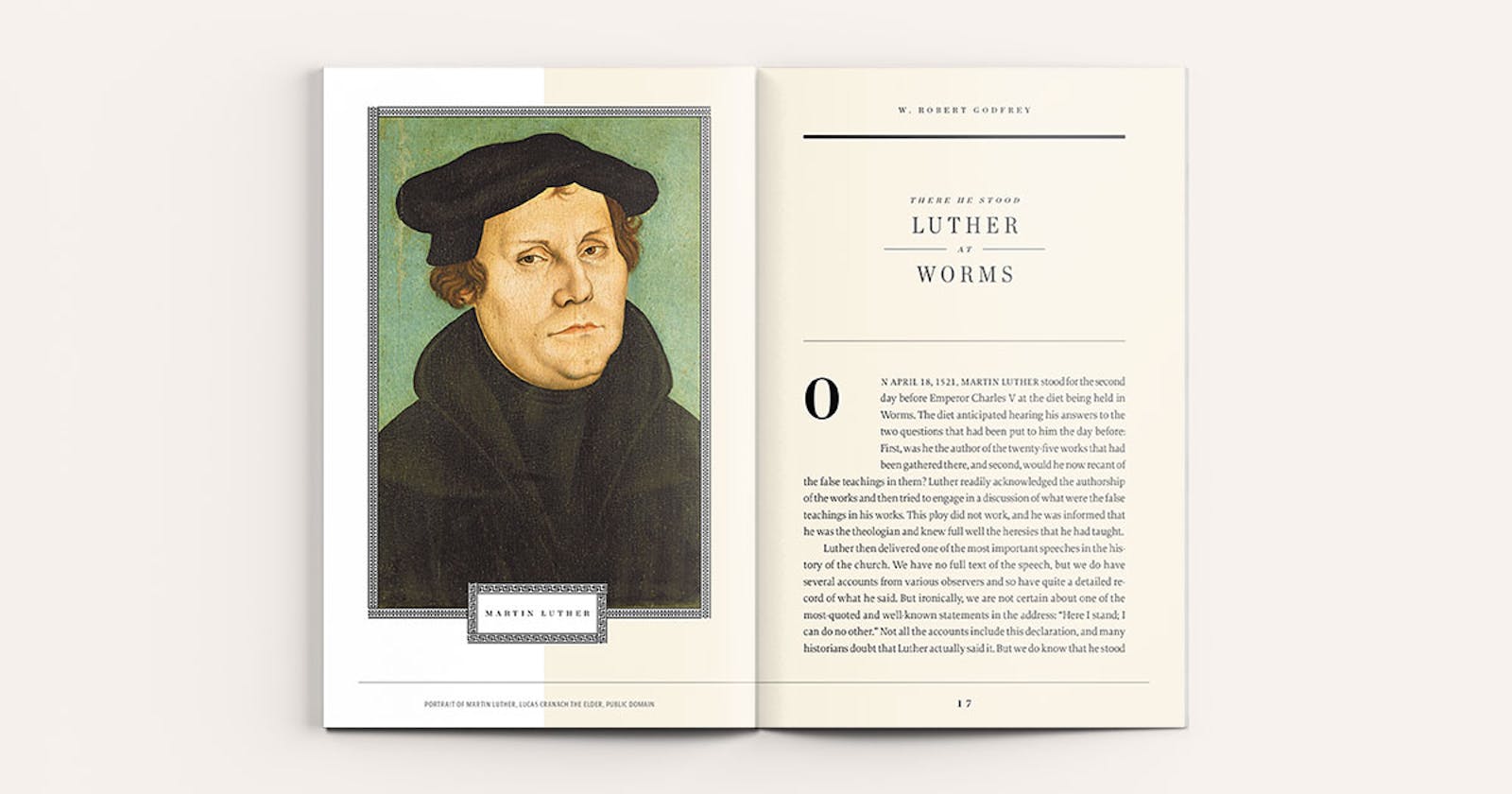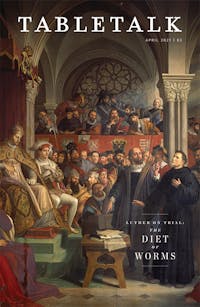
Request your free, three-month trial to Tabletalk magazine. You’ll receive the print issue monthly and gain immediate digital access to decades of archives. This trial is risk-free. No credit card required.
Try Tabletalk NowAlready receive Tabletalk magazine every month?
Verify your email address to gain unlimited access.
On April 18, 1521, Martin Luther stood for the second day before Emperor Charles V at the diet being held in Worms. The diet anticipated hearing his answers to the two questions that had been put to him the day before: First, was he the author of the twenty-five works that had been gathered there, and second, would he now recant of the false teachings in them? Luther readily acknowledged the authorship of the works and then tried to engage in a discussion of what were the false teachings in his works. This ploy did not work, and he was informed that he was the theologian and knew full well the heresies that he had taught.
Luther then delivered one of the most important speeches in the history of the church. We have no full text of the speech, but we do have several accounts from various observers and so have quite a detailed record of what he said. But ironically, we are not certain about one of the most-quoted and well-known statements in the address: “Here I stand; I can do no other.” Not all the accounts include this declaration, and many historians doubt that Luther actually said it. But we do know that he stood there before the powers of the world and the church with remarkable courage and commitment.
Luther had been remarkably brave to come to Worms. He was courageous to resist the pressure to make peace for himself and others by repudiating what he had taught and submitting to what the church had long taught. He showed that remarkable courage again in the bold words with which he concluded his address:
Unless I am convinced by the testimony of the Holy Scriptures or by evident reason—for I believe neither pope nor councils alone, as it is clear that they have erred repeatedly and contradicted themselves—I consider myself convicted by the testimony of the Holy Scriptures, which is my basis; my conscience is captive to the Word of God. Thus I cannot and will not recant, because acting against one’s conscience is neither safe nor sound. [Here I stand; I can do no other.] God help me. Amen.
With these words, Luther made clear the source of and authority for the theology for which he was on trial. He had already been excommunicated by the church, and now he was at risk of being declared an outlaw by the state, with his life and property forfeit, for this teaching.
The church had insisted that his conscience had to submit to its teaching. The church had developed over the centuries authority structures that it believed spoke for Christ. The pope, as the successor of Peter and the vicar of Christ on earth, had the authority to teach and bind the consciences of Christians. Ecumenical councils of the church also spoke the truth with the authority of Christ. The authority of popes and councils had been accepted for centuries in the Western church. How did one man dare to stand against those authorities?
Luther had faced such questions before, and he had prayed earnestly about this matter again during the night preceding his second meeting at the diet. There before the emperor he stated clearly the remarkable conclusion to which his studies had led him. First, his study of church history and theology had led him to the conviction that various popes and councils in their official teachings had contradicted one another. How could they have the authority of Christ and be without error when they failed to agree with one another?
Luther was not standing any longer simply as a medieval man who accepted without question the traditional authority of the church. Luther was in many ways a very medieval man in his life and beliefs, but he lived in the age of the Renaissance and profited from the work of Renaissance scholars. The Renaissance had led to the printing of many works from the history of the church that made it clear that theologians, popes, and councils had indeed differed from one another. The Renaissance awakened an appreciation of historical movement. The theology of the church had not been static and unchanging as it claimed. The medieval conviction that Scripture and tradition always agreed could not withstand scrutiny.
For Luther, however, much more important than the study of history and theology was the study of the Bible. As he liked to say, the church had made him a professor of the Bible and had made him swear to teach the Bible faithfully, and that was what he was doing and had always done. His conscience was captive to the Word of God, which was his only ultimate authority. By implication, he was teaching clearly that the Bible alone was always true and never contradicted itself. The Bible alone was the utterly reliable authority of Christ in the church. Where the Bible spoke, the Christian must believe and follow—whatever the consequences.

Luther knew that he was dividing Scripture from tradition in a way that had not been done for a very long time in the history of the church. He acknowledged to the diet that following the Word of Christ would divide the church:
Because of the Word of God, zeal and disputes arise. For that is the course, the manifestation, and the effect of the Word of God; as Christ says: I came not to bring peace but the sword: for I am come to set a man at variance against his father, and so on. That is why we must bear in mind that God is wonderful and terrible in his counsel, so we will not strive to smooth out differences if by doing so we condemn the Word of God. Through this a flood of insufferable evil will most likely pour over us.
As a profoundly biblical Christian, Luther knew that his calling was not to preserve the wealth, influence, or formal unity of the church. Still less was he called to preserve Christendom or Western civilization. He was called to preach the gospel.
In his appeal to conscience and evident reason, he was not standing as a “modern” man, defending individualism and personal freedom to believe whatever he wanted. He accepted the authority of conscience only as it submitted to the Word of God. In referring to evident reason, he was not establishing reason as an autonomous authority but was speaking rather of clear thinking or careful use of the mind in studying the Bible.
For Luther, the Bible was the very Word, the very revelation of God. It is as true as God is true. It is as reliable as God is reliable. It is as authoritative as God is authoritative. We humans must use our talents as made in the image of God to understand that Word, and as we are sinners hoping for salvation we must accept the gospel it teaches.
Luther powerfully described himself and his teaching as “captive to the Word of God.” He was not being creative or self-assertive or reveling in rebellion. Rather, he was driven by the Word, taken and held by the Word. He knew the danger, but he also knew the joy and freedom of teaching as the Scriptures and the Apostles had taught. This was the path that was safe as he stood before God and sound as he hoped for the mercy of Jesus. Luther embraced the cross and whatever it brought to him because he knew from the Bible that whether he lived or died, he was the Lord’s.
Luther’s final words at the diet—“God help me. Amen”—have often been overlooked or treated as just conventional piety. But these words are as important as anything he spoke that day. He committed his cause to God, who alone could help him ultimately. He did not know if he would live or die. But he had confidence that he had served the Lord faithfully according to His Word and had preached the gospel of Jesus Christ. He believed that the Lord would help him accomplish all that He had ordained for him to do. And God did fulfill His purpose as Luther had expected when he had adopted as his life’s motto the words of Psalm 118:17: “I shall not die, but I shall live, and recount the deeds of the LORD.”
God did help him. Luther would preach, teach, and write for another twenty-five years. He would not see the whole church reformed according to the Word of God as he had hoped. But he would see the Word of God restored to its proper place in the true church and would see the gospel preached and believed far and wide. He stood there at Worms and God helped him—and through Luther, God helped us. Amen.
